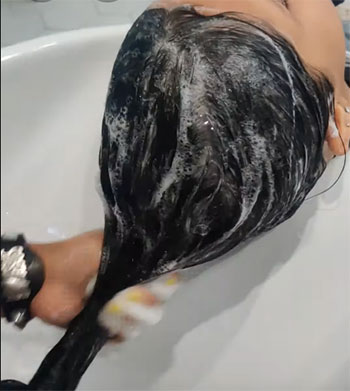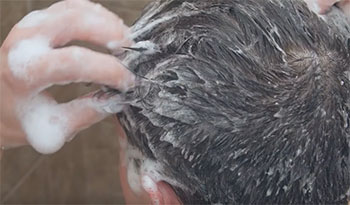If you’ve ever taken a stroll down the haircare aisle at your local store, you’ve likely noticed the abundance of shampoos boasting “sulfate-free” labels. But what exactly are sulfates, and why are they considered a controversial ingredient in shampoos?
In this comprehensive article, we’ll dive deep into the world of sulfates, exploring their role in shampoos, the potential drawbacks, and the reasons behind the growing demand for sulfate-free alternatives.
As consumers become more conscious of the ingredients in their personal care products, the debate surrounding sulfates has intensified. While some argue that sulfates are safe and effective cleansing agents, others raise concerns about their potential impact on hair health, scalp irritation, and environmental consequences.
By the end of this article, you’ll have a better understanding of the pros and cons of sulfates in shampoos, enabling you to make an informed decision that aligns with your hair care needs and personal preferences.
What are Sulfates, and Why are They Used in Shampoos?
Sulfates, specifically sodium lauryl sulfate (SLS) and sodium laureth sulfate (SLES), are anionic surfactants widely used in shampoos and other personal care products. These compounds are known for their excellent foaming and cleansing properties, which help to effectively remove dirt, oil, and product buildup from the hair and scalp.

Shampoo manufacturers often incorporate sulfates into their formulations for several reasons:
- Effective Cleansing: Sulfates are powerful detergents that create a rich, luxurious lather, making them highly effective at removing excess sebum, styling products, and environmental pollutants from the hair.
- Cost-Effective: Sulfates are relatively inexpensive ingredients, making them an economical choice for shampoo manufacturers, especially in mass-market products.
- Consumer Expectation: Many consumers associate a rich, foamy lather with an effective cleansing experience, and sulfates help deliver that desired lather.
While sulfates undoubtedly contribute to the cleansing power and lather of shampoos, their inclusion has also sparked debates and concerns among consumers, leading to the rise of sulfate-free alternatives.
Potential Drawbacks of Sulfates in Shampoos
Despite their widespread use, sulfates have been subject to scrutiny due to several potential drawbacks associated with their use in shampoos:
- Scalp and Skin Irritation
One of the primary concerns surrounding sulfates is their potential to cause scalp and skin irritation, particularly in individuals with sensitive skin or conditions like eczema or psoriasis. SLS and SLES are known for their ability to strip away natural oils from the hair and skin, which can lead to dryness, itching, and irritation.
- Drying Effects on Hair
Sulfates are often accused of being overly harsh on hair, stripping away not only the excess oils but also the essential natural oils that contribute to hair’s health and shine. This can result in dry, brittle, and frizzy hair, especially for those with naturally dry or chemically treated hair.
- Environmental Impact
Some environmental advocates have raised concerns about the impact of sulfates on aquatic ecosystems. When rinsed down the drain, sulfates can contribute to the formation of toxins and disrupt the natural balance of waterways, potentially harming aquatic life.
- Potential Health Concerns
While the safety of sulfates in personal care products is still debated, some studies have suggested that prolonged exposure to these compounds may be linked to potential health risks, such as skin irritation, endocrine disruption, and even carcinogenic effects. However, more research is needed to establish definitive connections.
The Rise of Sulfate-Free Shampoos
As awareness of the potential drawbacks of sulfates has grown, so has the demand for sulfate-free shampoos. These alternative formulations typically rely on gentler surfactants derived from natural sources, such as coconut oil, sugar, or amino acids, to provide a milder cleansing experience.
Sulfate-free shampoos are often marketed as being gentler on hair, scalp, and the environment. They are designed to cleanse effectively without stripping away essential oils or causing excessive dryness or irritation.
However, it’s important to note that not all sulfate-free shampoos are created equal. Some may still contain other potentially harsh ingredients, while others may prioritize gentleness over effective cleansing power. As with any personal care product, it’s crucial to read the ingredient list and choose a formulation that aligns with your specific hair and scalp needs.
Also watch the video!
A Conversational Tone: The Great Sulfate Debate
Imagine you’re having a casual conversation with a friend who’s curious about the ongoing debate surrounding sulfates in shampoos. Here’s how you might break it down in a conversational, engaging manner:
“Hey there, friend! So, you’ve probably noticed all those fancy ‘sulfate-free’ shampoos popping up everywhere these days. But what’s the big deal with sulfates, and why are people so worked up about them?

Okay, first things first: sulfates are these hardcore cleaning agents found in a lot of shampoos. They’re the secret weapons that give you that rich, sudsy lather we all love. The thing is, they’re pretty darn good at their job – maybe a little too good, if you know what I mean.
You see, while sulfates are kickin’ at getting all that gunk and grime out of your hair, they can also strip away the good stuff – like your natural oils. And let me tell you, nobody wants dry, brittle hair that feels like straw.
But that’s not all. Some people think sulfates can be a little too harsh on sensitive scalps, causing irritation, itching, and all sorts of unpleasant business. And there are even whispers that they might not be the best for the environment, but the jury’s still out on that one.
So, what’s the alternative? Enter the sulfate-free shampoos! These guys use gentler cleaning agents derived from natural sources, like coconut oil or fancy amino acids. They’re supposed to be kinder to your hair and scalp, without stripping away all the good stuff.
Now, I’m not saying sulfate-free shampoos are the answer to all your hair woes. Some people swear by them, while others think they don’t pack quite the same punch when it comes to deep cleaning. It all comes down to personal preference and what works best for your hair type.
At the end of the day, the great sulfate debate is all about finding that sweet spot between effective cleansing and hair-loving gentleness. Whether you’re team sulfate or team sulfate-free, just remember to pay attention to how your hair and scalp feel – and don’t be afraid to experiment until you find your perfect match!”
Frequently Asked Questions
Sulfates are not inherently bad for your hair, but excessive or prolonged use can lead to dryness, frizz, and potential damage. If you have sensitive skin, color-treated hair, or prefer a gentler cleansing experience, sulfate-free shampoos may be a better option.
Many people report experiencing improved hair manageability, reduced frizz, and longer-lasting hair color when using sulfate-free shampoos. However, the effectiveness can vary from person to person based on hair type, lifestyle, and personal preferences.
The main concern with sulfates is their potential to strip the hair and scalp of natural oils, leading to dryness, irritation, and accelerated color fading. They can also exacerbate scalp conditions like eczema or psoriasis in some individuals.
Some high-end shampoos contain sulfates because they are effective cleansing agents and can create a luxurious, foamy lather. Manufacturers may also include other nourishing ingredients to counteract the potential drying effects of sulfates.
Also Read: Why Does Shampoo Make My Hair Greasy? – Causes & Solutions
Conclusion
The sulfate debate is a complex one, with valid arguments on both sides. Ultimately, the decision to embrace or avoid sulfates comes down to personal preferences, hair type, and individual needs.
Whether you choose to go sulfate-free or stick with traditional sulfate-based shampoos, the key is to listen to your hair and scalp’s unique requirements.
Remember, healthy hair starts with a balanced routine tailored to your specific needs. Don’t hesitate to experiment and consult with professionals to find the perfect haircare regimen that leaves your locks feeling nourished, vibrant, and fabulous!
